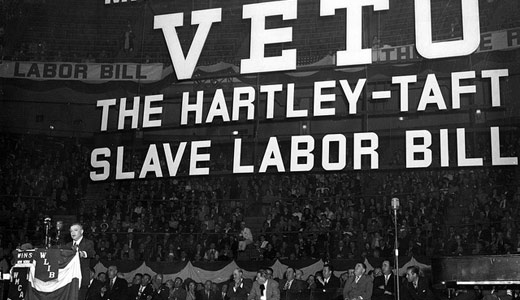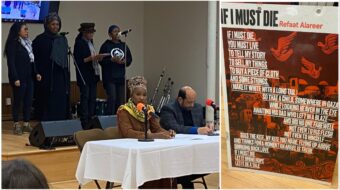
It is one of those ironies of history that on December 10, 1948 the United Nations adopted the Universal Declaration of Human Rights, and that December 10th of each year is celebrated as “International Human Rights Day.” Article 23 of that document says, among other things that “everyone has the right to form and to join trade unions for the protection of his interests.”
Sixty-four years and one day later, on December 11, 2012, the Michigan state legislature passed and the governor signed what is called a “right to work (for less)” law.
Much has been written about how the law weakens labor unions because they can no longer collect dues from workers who choose not to join. Unions with fewer dues-paying members have less muscle to stand up to the bosses and defend their members’ rights. Employers have been fighting against expanding workers rights since the beginning of time. This is particularly true when workers rise up to right intolerable wrongs.
During the Great Depression the labor movement, often led by communists and other militants, achieved great breakthroughs. President Franklin D. Roosevelt signed into law the National Labor Relations Act, also known as the Wagner Act (often called labor’s Magna Carta), which ensured unions the right to organize and bargain collectively. Workers in every state undertook heroic struggles to gain a voice in determining the conditions of their employment. Millions of workers joined unions and won many hard-fought strikes.
The capitalists and their political minions did not sit idly by; they did not want their power and control over the workers diminished. After World War II, at a time when the percentage of workers with union cards reached an all-time high and militancy was on the rise, the right-wing in Congress struck back. Both houses passed the Taft-Hartley Act, and though President Harry S. Truman vetoed the bill, Congress over-rode the veto. The law’s provisions struck right at the heart of labor unions.
The main points of the law are as follows:
It outlawed closed shops–where employers as part of a collective bargaining agreement could only hire union members. This is the “right to work” (for less) provision.
It allowed states to outlaw the union shop–enabling states to pass laws that prohibited labor agreements that had required newly-hired workers to join a union. Michigan became the twenty-fourth state to pass such legislation. Indiana passed similar legislation in February. Some states have enshrined “right to work” in their state constitutions.
It prohibited federal employees from striking.
It barred unions from making direct contributions to political candidates (which is why various unions have political action committees to handle such contributions separately.)
It prohibited members of the Communist Party from holding union offices. (This provision was overturned by the Supreme Court in 1965 in United States v. Brown.)
Therefore, we can conclude that the Taft-Hartley Act is an outdated relic of the Cold War. Its provisions restrict the rights of unions and weaken them in their relations with the employers. Congress should repeal the law and replace it with legislation that guarantees organized workers the right to reinstate the closed or union shop through collective bargaining in any state. It would go a long way toward strengthening the labor movement. Such a goal should be a part of any fightback by workers against the ultra-right and its drive for unfettered power.
Photo: Labor leader David Dubinsky gives a speech against the Hartley-Taft bill, with Luigi Antonini in the audience, May 4, 1947. Kheel Center, Cornell University // CC 2.0










